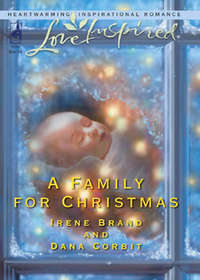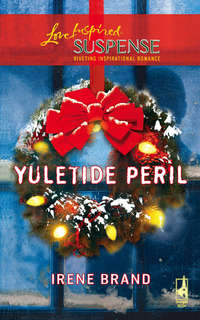
Полная версия
A Groom to Come Home To
She had been climbing steadily, and the afternoon was warm, so Beth pulled off her jacket and leaned against a towering oak as she peered through the trees at the Cumberland River Valley to the west. A haze hung over the valley, but she could see the crowded, narrow streets of Harlan, and her school building in the middle of town.
“Hi, Beth Warner.” The voice startled her, and she looked around wildly. She hadn’t suspected that anyone else would be hiking today. “Look up. I’m in the tree.”
Beth recognized his voice, and she looked upward to see Clark peering over the edge of a hunting platform, loftily perched in the branches of the large oak tree.
“Hi, Clark Randolph.”
“Come on up,” he said, indicating the homemade ladder attached to the tree. “The view is a lot better from up here.”
“Warners don’t talk to Randolphs.”
“Why?”
“Why, what?”
“Why won’t Warners talk to Randolphs?”
Beth thought for a while, and she laughed. “I don’t have the least idea.”
“Neither do I,” Clark said. “Here, I’ll give you a hand.”
Throwing caution to the wind, Beth set her foot on the first rung of the ladder, thus charting her course along a path that had brought her pleasure and comfort, but which had also caused much of the grief and loneliness she was experiencing today. She hadn’t thought of the long-range consequences that day, however.
With an outstretched hand, Clark was waiting to help her onto the platform where he knelt.
“What are you doing up here?” Beth asked, glancing around with interest.
“Looking into your pretty green eyes,” he said.
“Oh, be serious. I mean, what were you doing before I came along?”
“Building a deer stand for hunting season. I had one down the mountain a ways, but it’s crumbled into ruins.” He pointed proudly to what he had already accomplished—a square platform built from rough lumber, with a miniature shack in the middle of it. “I built the little room to sit in if it’s raining or snowing. Most of the time, I’ll sit here on the platform and watch.”
“Do you own this mountain?”
He laughed. “Mining companies own most of these woods, but some of the owners allow hunting.”
“I never come in the woods during deer season.”
“A good idea—it’s too dangerous. But that’s three weeks away. You can ramble around until then.”
Beth sat beside Clark and they dangled their feet over the side of the platform.
“How are you getting along at school, Beth?”
“All right. I’ve been studying hard, and my grades for the first grading period were tops. My parents are really proud of me.”
“I’ve heard how you’ve been sitting at night with Mrs. Reymond. Not many girls would give up their evenings to sit with an old lady. I hear she’s kinda grouchy, too.”
Beth laughed. “She is, but I’m used to grouchy old people. My daddy is grouchy with everyone except me. It’s because they don’t feel very well, so I just overlook it.”
Clark’s admiration for her was evident in his eyes. “You’re a caring person, Beth. I admire that.”
His candor embarrassed Beth, and she didn’t know how to answer him, so she lifted a hand and brushed back her long hair nervously.
“I’ve been wanting to talk to you, Beth, but you acted like you didn’t want anything to do with me.”
“I was afraid to talk to you. My folks weren’t too keen on my going to school in Harlan anyway, and I figured if Daddy heard I’d been talking to a Randolph, that would be a good excuse to take me out of school.”
“So it wasn’t that you didn’t want to be friends?”
Beth shook her head, lowering her eyes.
With a gentle hand, Clark turned her head to face him. “Answer me, Bethie,” his deep voice insisted.
“No, I liked you right from the start,” she admitted, her gaze meeting his brown eyes unflinchingly. “Until I found out who you were.”
“These old feuds are foolish, anyway,” Clark said.
“I’ve never known what caused the trouble. Daddy always gets so angry when I ask him, I’ve stopped mentioning the Randolphs.”
“Best I can figure out, the Warners and the Randolphs fought on different sides in the Civil War, and they wouldn’t let their differences die when the war ended.”
“That’s over a hundred years ago!”
“But it was a common situation in many border states where loyalties were divided. Even after the fighting ended, older people harped on the past and kept the bitterness stirred up.”
“Like my daddy,” Beth said. “He doesn’t have anything else to think about.”
“Then you will be my friend?” Clark persisted.
“If we can keep my family from finding out, but that won’t be easy.”
“We can meet up here until it’s really cold, and then we’ll think of something else. I feel as if I just have to be with you, Beth. Something happened to my heart that first day when you got on the school bus, and I haven’t been able to get you out of my thoughts since.”
Beth felt her face flushing, and she couldn’t meet Clark’s eyes, but she didn’t resist when he took her hand in his. She didn’t doubt the truth of Clark’s words, for hadn’t she felt the same? Some of her girlfriends would talk about crushes they had on boys. Some even believed they were in love. Beth had never felt that way about a boy. But the way she felt about Clark was different. All new. A giddy feeling, yet serious and even frightening. Did she love Clark? Was that what had happened to her?
She hoped not, because Clark Randolph was not the kind of person who could share her plans for the future. He intended to work in the coal mines as soon as he graduated from high school, and she never wanted to marry a miner.
“What about your family, Clark? Is your father a miner?”
“He used to be, but he was hurt in a slate fall when I was just a boy, and he’s not been able to work since. I have two little sisters, and my mother takes care of all of us. She hasn’t had an easy life, but you never hear her complaining. My daddy is a preacher now.”
Clark looked upward at the colorful foliage and the white clouds floating by in a baby-blue sky, then sighed deeply. “Do you know what I think of when I’m out in the woods on a day like this? I think of God. What do you think of, Beth?”
“I don’t think of God, that’s for sure. I think of the beauty, I suppose.”
“But God is the one who created all of this beauty that reminds me of the words of the psalmist David, ‘The heavens declare the glory of God; and the firmament sheweth his handiwork.’ How could you not think of God?”
Beth’s legs were getting numb, and she inched away from the side of the platform to lean against the small structure. Clark moved close to her as a slight breeze scattered reddish-brown oak leaves over their shoulders.
“If your father is a preacher, then you probably hear a lot about God at your house, but my daddy doesn’t hold with religion. The only time I ever hear God mentioned is when my half brothers are visiting. They cuss a lot, using God’s name.”
“But I want you to know the God I do, Bethie. I can tell you’re lonely and fearful lots of times. If you accept Jesus, God’s son, into your heart, life will be a lot more peaceful for you.”
“Perhaps what you say is true, but when I’ve gotten this far without God, I don’t figure I need Him now.”
“Someday you’ll change your mind. You’ll want God really bad, and if you do, call out to Him. He will hear you.”
Clark’s words were foreign to Beth, but because she liked to hear him talk, she listened, and for the first time, a tiny seed was planted in Beth’s heart.
Chapter Two
Their secret friendship continued throughout the rest of the school year, and while their interest in each other must have been evident to their classmates, Beth’s family didn’t learn about it. They sat together on the bus occasionally, although they tried to be casual about it. Sometimes when he walked past her seat, Clark would drop a folded note into her lap. By spring she had accumulated many of them. Beth hid the notes in a shoe box beneath her bed. She wouldn’t throw Clark’s messages away, but if she didn’t hide them, either her mother or grandmother was sure to find them.
Beth got out of bed and walked around the cold motel room, her eyes misting when she thought of those notes. She still had them in her possession, but she didn’t need to read them anymore—the words of most of them were etched on her heart. As the sound of running water in the rooms beside hers signaled that morning had come, she remembered one of the messages he had given her “You’re looking mighty pretty this morning. The sun is shining on your hair, making it the color of autumn leaves. I dreamed about you last night, Bethie.”
On the day before the schools closed for the Christmas holidays that year, Clark had slipped a note to her when they passed in the hallway.
His message was brief: “Try to come to the tree stand on Christmas Eve. I’ll be there around noon.”
Christmas had no particular significance for Beth’s family, although some of her half siblings and their families usually came for the day. Beth had worked hard for two days helping her mother prepare for the meal, and Mrs. Warner had no objection when her daughter stated her intention of hiking for a few hours.
Beth suspected that Clark would bring her a present, and she wanted to buy something for him, but since her parents were sacrificing to pay her school expenses, she wouldn’t use any of their scarce money to buy a gift for a Randolph. Before she left the house, she slipped one of her school pictures into her pocket
The weather was mild for December, and Beth was panting hard and sweating profusely before she reached the tree house, where Clark was already waiting at the base of the tree. His brown eyes brightened when he saw her, and he pulled her into his arms—a liberty he hadn’t taken before.
“Merry Christmas, Bethie,” he whispered, and lowered his head to kiss her lips tenderly.
Breathless, Beth whispered, “It’s my first kiss.”
“Mine, too. You’re the first girl I’ve ever wanted to kiss,” Clark said, and he bent over and kissed her again.
“See what I’ve been doing while I waited.” He pointed to the trunk of a beech tree, where he had carved a large heart to enclose his initials and hers. “C.R. loves B.W.,” he read proudly.
In an effort to slow the acceleration of her heartbeat, Beth said sternly, “I hope none of my family sees that.”
Clark laughed. “Not likely that they will. It’s cold and windy up on the platform. Let’s walk around the mountain and find a spot in the sun.”
Hand in hand, they wandered into the deeper woods, and Beth said, “I feel terrible sneaking around to meet you this way. There have been a few times I’ve been tempted to tell Mom, but I’m afraid she’ll tell Daddy, and that would be the end of our friendship.”
Clark squeezed the hand he held. “I’ve been praying for a way for us to be together always without keeping it a secret.”
Beth grew tense as she always did when Clark mentioned the future.
“Do you ever think of leaving here?” she asked.
Clark stopped in midstride and turned to her in surprise. “‘Leaving’? You don’t mean—leave Kentucky?”
She nodded. “I want to go someplace else to live as soon as I graduate from high school. I don’t suppose I’ll have enough money to go to college, but I’m going to take secretarial courses during my last two years in school, and I should be able to find a job. I thought I could save some money and try to go to college at night.”
“What do you have against Kentucky?”
“I don’t want to live as my parents have. And I can’t see that my life will ever improve if I don’t move away.”
They sat down at the entrance to a small cave where the sun shone directly on them. “It seems we have different ideas about what the future holds for us,” Clark said, disappointment evident in his voice.
Beth was sorry to have hurt Clark’s feelings, but she had to be honest with him. “I thought I should tell you.”
Clark drew a package from his pocket “This may not be the kind of gift you want, but even if we don’t agree on the future, I know that you’ll never be truly content unless you follow the way of life presented in this book. If you want to serve other people, the path starts here.”
Unsuspecting, Beth opened the package and found a Bible. Trying to stifle her disappointment, she murmured, “Thank you,” wondering why he thought she would want a Bible.
Beth had attended church with her grandmother a few times, so she had some basic knowledge about what the Bible was, but she’d never read it for herself, and it felt like a heavy weight lying in her hand and on her heart. Perhaps sensing this, Clark said, “I hope you’ll read it, and a good place to start would be the New Testament. A new way of life will open to you when you read these words.”
“I don’t know, Clark,” Beth said hesitantly.
“You do believe in God, don’t you?”
“I haven’t thought about it a lot.”
“Promise me you’ll read it.”
He took the Bible from her hands and opened it “Why not start with the Christmas story?” He turned to the second chapter of Luke. “‘And it came to pass in those days, that there went out a decree from Caesar Augustus, that all the world should be taxed.’”
The reverence in his voice and the intent expression on his face disturbed Beth, and she quickly took the Bible from his hand.
“All right, I’ll read it, but I have to go home now. I told Mom I wouldn’t be gone very long. I’m worried about her, Clark. I think she’s sick and won’t tell me. I don’t know what I’d do if anything happened to her. Daddy can’t stay by himself, so I would probably have to quit school and stay home to take care of him. I love my parents, and I suppose my decision to be of service to others should start at home, but I can’t bear the thoughts of being stuck in that hollow for the rest of my life.”
Clark put his arm around her shoulders and pulled her close as they walked along the narrow trail. “I’ll take care of you, Bethie.”
Before they parted, Beth said, “I didn’t know what to give you for Christmas, but I thought you might like this.” She withdrew the photo of herself from her pocket and handed it to Clark.
His face lighted, and he kissed the photo. “You couldn’t have given me anything to please me more. I wanted one of your pictures and thought of giving you one of mine, but I was afraid I’d get you into trouble.”
“It’s true that I can’t have your photo around the house.”
Clark pulled her into a tight embrace, and when he lowered his lips to hers, a new, strange emotion stirred in the deepest recesses of Beth’s heart. Since it was strange, it was also frightening; but as Clark’s kiss intensified, the tender, sweet feelings that swept over her seemed so wondrous and precious. Was this love? Would it persist, or would she awaken tomorrow wondering what had sparked this rare emotion?
Beth’s arms were around Clark’s neck when he lifted his lips, and she looked long into his eyes, trying to interpret what message they held for her, but Clark didn’t leave her to wonder.
“I love you, Bethie. I have since the first day I saw you, and I’ll love you until I die.”
“How can you be so sure?” Beth murmured. “Lots of things could happen to turn your love from me.”
“I guess I’m like Daddy. The minute he saw my mother, he knew she was the girl for him.”
“I care for you, too, Clark. I think about you all the time when we’re apart. But you know as well as I do, there’s no future for us together.”
He shook his head as if he wouldn’t accept her decision, but she pulled away from him after placing a gentle kiss on his cheek.
As Beth walked down the mountain, she thought of what she had experienced when he’d kissed her. She didn’t want to love Clark. She wanted to love a man who would take her away from Harlan County, and Clark obviously wouldn’t. Not that Beth had anything against Kentucky in general. She wouldn’t mind living in Louisville or Lexington—she was just tired of Warner Hollow, and she wanted to get away from her half brothers, who were always in some kind of trouble with the law.
When she got home, Beth locked the Bible in a small cedar chest in her room, but that night after she undressed, she retrieved the Bible and took it into bed with her. The room was too cold for her to stay up for long, but she did open to the Gospel of Luke where Clark had told her to read. The account of the birth of Jesus was interesting, but it meant no more to her than a story she might read in a history book. As she leafed through the pages of the Bible, she noticed that Clark had underlined certain verses. She didn’t read all of them, but one caught her eye, and she read aloud, “‘Many waters cannot quench love, neither can the floods drown it: if a man would give all the substance of his house for love, it would be utterly contemned.’”
Was this another way Clark had of declaring his love for her?
Beth tucked the Bible under her pillow and turned out the light. As she snuggled under the heavy quilts, she thought of the two gifts Clark had given her today—his love and the Bible. Sleep would have come much more quickly if she hadn’t been beset by the overwhelming certainty that her future happiness depended on the value she placed on those gifts.
As Beth dressed for the day she remembered that Christmas Eve long ago. She recalled how, in spite of her dreams of the future, she had never believed that she could achieve the goal she had now reached. Her good fortune had come about as a result of a scholarship. During her last year in high school, she had applied for and received a grant awarded annually by Shriver Mining Company for the orphan of a disabled miner.
The grant had guaranteed funds for a five-year curriculum or less, depending upon the choice of careers. It provided for tuition, books, housing, food, and a transportation allowance. The recipient of the scholarship would matriculate at a college in eastern Pennsylvania that was heavily endowed by Shriver Mining Company, and she could choose from a variety of vocations, most of them specifically planned for service in the coalfields. All of this had sounded fine until Beth came to the last few lines.
This scholarship is conditional upon the willingness of the recipient, after graduation, to return to Kentucky and work for two years in the coalmining region, using her training for the good of the people in the area. The recipient will be compensated by the prevailing wage at that time in the profession she has chosen.
Beth’s disappointment had been as keen as a knife wound when she’d read that stipulation, for she had considered the scholarship a ticket to a life outside Kentucky, and momentarily, she had considered rejecting it, but would she ever have a better opportunity for advancement? Probably not.
There had been no money from any other source. She had accepted the scholarship, and latently remembering her dream to be a second Florence Nightingale, had registered in a five-year program that would qualify her as an advanced registered nurse-practitioner. She’d completed her training in four and a half years by taking classes at night and during summer sessions. She had also worked for a year, at a minimal wage, in the maternity department of a local hospital in order to be certified in midwifery. Her strenuous schedule had left her no free time, and she hadn’t been back to Kentucky since she’d left
In fact, she hadn’t wanted to come back even now. But she had committed herself, and she had an eleven o’clock appointment in Lexington with Milton Shriver, CEO of Shriver Mining Company. As she accessed I-75, heading north, a glance at her watch showed that she had two hours remaining until then.
No wonder Shriver Mining could afford to pay my way through college, Beth thought when she drove into the company’s paved parking lot and found an empty spot reserved for visitors. The four-story brick building had been built ten years ago, she noted on the cornerstone. If she could work here, perhaps her two years of service, which she had been dreading like a prison sentence, might not be too bad.
Beth was a little worried about her appearance, for her wardrobe was limited. She had dressed this morning in a gray wool suit she’d found at a thrift shop. It looked nearly new and the classic tailored style didn’t look totally out of fashion. She wore it with a green blouse that enhanced her eyes, and had added the pearl necklace and earrings that had been a high-school graduation gift from her grandmother. She had applied makeup sparingly except for an extra dab of foundation below her eyes, which were weary from lack of sleep.
As Beth entered the building, her small supple body was mirrored in the gleaming front door, and she appraised her appearance. She couldn’t afford anything better, but overall her outfit looked fashionable.
“I have an appointment with Milton Shriver,” she said to the receptionist, in a voice that trembled slightly.
“Your name?” the woman inquired, looking Beth over curiously, making her wonder if the receptionist could tell she was wearing secondhand clothing.
“Beth Warner.”
The woman spoke into the intercom. “Beth Warner to see you, Mr. Shriver.”
“Please show her to my office,” a deep voice answered.
“This way,” the tall, well-proportioned woman said, leaving her chair with one fluid movement and indicating that Beth should follow her. Their footsteps made no noise on the thick carpet as they moved down the hallway, the walls of which were lined with portraits of past company officials.
The receptionist opened the door into a large room decorated with framed black-and-white photos of mining activities in an earlier period, and said, “This is Mr. Shriver, Miss Warner,” and motioned Beth inside.
A portly, graying man, probably in his sixties, Shriver left his desk and came to greet Beth. “It’s a pleasure to meet you at last, Miss Warner. I had hoped that you would pay us a visit before this.”
“I didn’t have any time for visiting. I kept to a heavy schedule so that I could finish my training early. Besides, Grandmother Blaine, my guardian, died the summer I went away to college, and I didn’t have any other ties here. This is the first time I’ve returned to Kentucky since I went away to college.”
Seating Beth in a chair near his desk, Shriver said, “We’re pleased with your college record. It’s customary for the director of student affairs at the college to give us an annual report on the progress of our scholarship recipients. You’re to be congratulated for your achievements.”
Beth accepted his praise with a nod. “I owed it to Shriver Mining to learn as much as possible. I appreciate winning the scholarship—I could never have gone to college without it. And now, what am I to do for the next two years?”
Shriver smiled. “We hope that you will consider working many years for our firm, but after two years, you are free to make your own decision.” He intertwined his fingers as he contemplated. “We were pleased when you chose the nursing profession, because one of our greatest concerns is the health of our miners and their families. And there’s a trend in our area for women to prefer home birthing, so your training in midwifery was an excellent choice.”
“My paternal grandmother was a rather famous midwife, and I may have inherited the desire to follow in her footsteps.”
“We’re currently launching a program of health care and are anticipating your help in getting it started out. We plan to establish an outpatient clinic—which we want you to organize and manage—with a major focus on service to women and children. Our miners’ families can come there, at minimal cost, for their health needs. And you would also be available for assisting at home births if the women prefer that.”
“There wouldn’t be a doctor at the clinic?”
“Yes, in a supervisory role. Wesley Andrews, a notable doctor in the area, would be at the clinic a few hours each week, but you will take part of the heavy load he carries by monitoring blood pressure and similar problems, giving immunization shots, and treating colds and flu. But maternity care will be your major focus, with prenatal and postnatal instruction as you can fit those classes into your schedule. Later on, if this proves successful, we will build other clinics. This will be a pilot project, and your success will greatly influence our plans for expansion. What do you think?”









